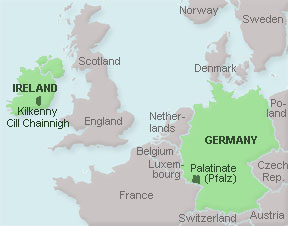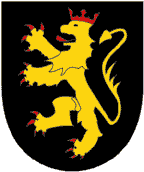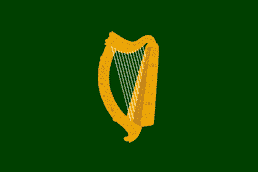
sk any young Irishman who the Palatine Germans were, and you will get a very
blank look in the majority of cases. However, anyone familiar with the story
of John Kelly—from
the song “Kelly, The Boy From Killane”—will be aware of who these people were.
Many were migrating for economic reasons, but the official reason was the
wars in the southwest  of Germany in the 1650–1750
period. England took in large numbers of Germans as refugees, and dispersed
them throughout Britain
and Ireland when the issue became a hot one in the country.
of Germany in the 1650–1750
period. England took in large numbers of Germans as refugees, and dispersed
them throughout Britain
and Ireland when the issue became a hot one in the country.
They did not integrate well, as in they did not become British,
but kept their language among themselves, and kept to themselves. The image
prevalent
among us today of them was they were hard working and helpful to their neighbours.
My mother recounted a story of some in Limerick (Luimneach) where they showed neighbours
a better way of farming and were scorned. So they did not fall out, rather
the Irish cottier did it his way, and the German did it the right way.
The Irishman saw the German had a good crop, and he a poor one. So next season
he listened when offered advice.
 The
old
Palatine arms
The
old
Palatine arms
|
The great thing about these Germans was they could offer help, were humble
enough not to take offense when not taken up on it, and willing to teach
what they knew when asked.
 The
unofficial Irish flag between the 17th century and 1922
The
unofficial Irish flag between the 17th century and 1922 |
It is thought that a variant of German English was spoken around
Callan (Callainn), County Kilkenny (Cill Chainnigh), among certain families up until
the 1900s, though most adopted Irish names. Their
menfolk were known to be very tall, and Kelly was described in the song as
being “seven
feet is his height with some inches to spare.” He was a rebel leader in the
1798 rebellion I think.
It was memories of these that gave Ireland such sympathy with Germany in
World War I and World War II, the German been seen as hard-working, sober,
helpful, everything we could and should be but were too busy enjoying ourselves
to be.
German Refugees

fter World War II was over, and during it, Ireland took in a number
of Germans as refugees, as they were being expelled en
mass from occupied states, be
they rightful in residence, or otherwise. It is a fact of history that Ireland
looked more favourably on the Germans after the war than on the Jews before
and during it, a topic about which there is great debate to this
day.
However, it was opportunity more than charity that was the main reason for
the refuge been offered.
All youths who arrived in Ireland—old
and infirm were not allowed—were
sent to farms as live-in labourers, some as young as five or six years old.
They were used in the same way—and that is the only way to think of the
way they were made work—as were all agricultural labourers: no regular
hours, poor food and clothing, a little better than slave labour.
Some couples arrived with families, but they were rare.
My mother remembers one who was in her school, some classes above her, who
was picked on by the headmaster. Daily floggings with the rod was his lot,
and while a big strong lad, he was hammered, over nothing bar being different.
And after school he went to where he lived and worked and worked and worked,
often being late for school due to overwork—or
indeed working before school—to
come into a tirade from a teacher who will remain nameless but was little
more than an animal.
He left the country in his 16th year, and as far as I know he joined the
British Navy. While his family that he stayed with treated him fairly well,
all compared
to others, his was a brutal existence.
How many came in, we are not aware, and no-one from my mothers area
heard of the chap since.
Other
pages:
• Tomás Ó Cárthaigh’s Website
• Tomás Ó Cárthaigh’s Works in the Lowlands-L Gallery

